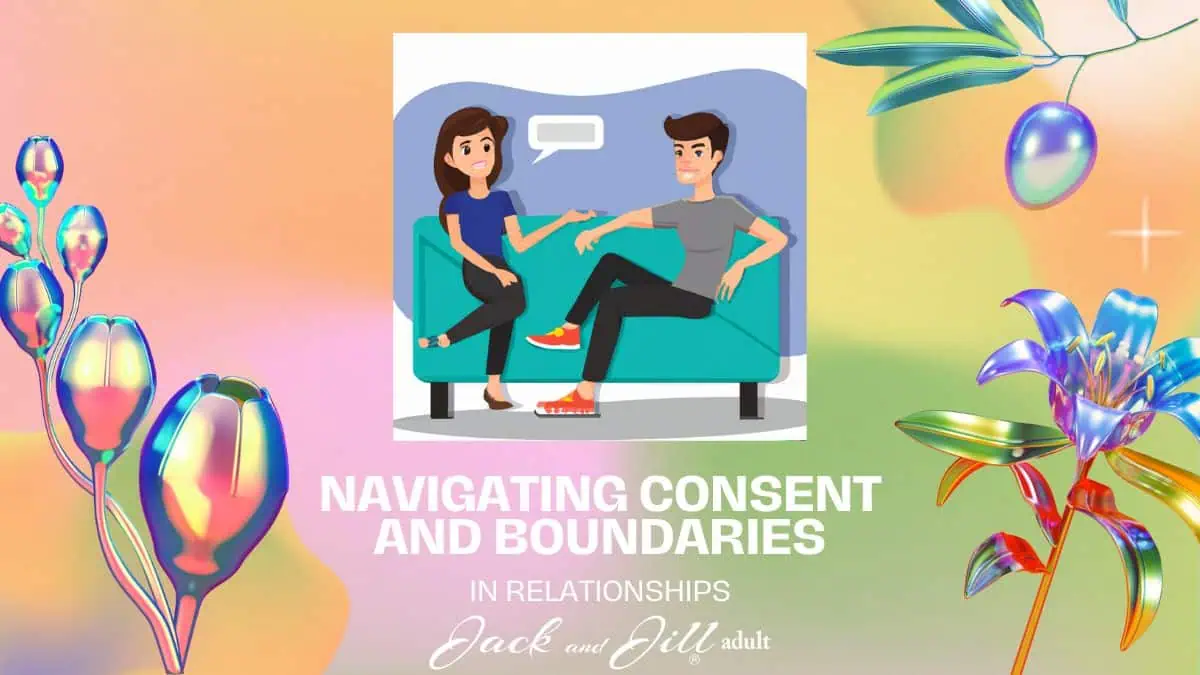
Navigating Consent and Boundaries in Relationships
When it comes to relationships, understanding sexual consent and personal boundaries is essential. You have the right to decide and practice consent concerning your body and choose what activities feel safe for you in any relationship in your sex life. Establishing clear communication with your partner about these topics is important so both parties can engage in healthy conversations around consent and healthy boundaries.
Table of Contents:
- What is Consent?
- Definition of Consent
- Types of Consent
- The Importance of Consent
- Establishing Boundaries in Relationships
- How to Talk About Consent and Boundaries with Your Partner
- Recognizing Signs of Unhealthy Relationships and Abuse
- Navigating Difficult Conversations Around Consent and Boundaries
- Building Trust Through Open Communication About Consent and Boundaries
- Self-Care After Difficult Conversations Around Consent and Boundaries
- FAQs in Relation to Consent and Boundaries in Relationships
- What is the difference between boundaries and consent?
- Why are consent and boundaries important?
- What are the three rules of consent?
- What are examples of consent in a relationship?
- Conclusion
What is Consent?
Consent is an agreement between two or more people to engage in a particular activity. It is the foundation of any healthy relationship and should always be respected.
Definition of Consent
Consent is “permission for something to happen or agreement to do something”. In terms of relationships, both parties have agreed on the activities they will participate in and are comfortable with them. It also means that each person has the right to change their mind so as not to feel pressured or guilty into doing something they don’t want to do.
Types of Consent
There are several types of sexual consent: verbal, written, implied, and enthusiastic. Verbal consent requires one party to ask another if they would like to engage in a certain activity before proceeding, from kissing someone to having sex with them.
Written consent involves signing a document stating that both parties agree on what activities will take place; this can help protect both parties legally if needed down the line. Implied consent occurs when nonverbal cues such as body language suggest that someone wants an activity but does not explicitly say so out loud; however, it should never be assumed that someone consents just because they haven’t said no yet.
Finally, enthusiastic consent occurs when both parties enthusiastically agree to engage in an activity without hesitation or reservation. This type of consensual interaction ensures everyone involved feels safe and respected throughout the experience.
The Importance of Consent
The importance of seeking consent cannot be overstated—it helps ensure everyone involved feels safe and respected during sexual interactions while protecting all individuals from potential legal repercussions later on down the line (e.g., rape charges).
Additionally, it allows partners to communicate openly about their desires, leading to better intimacy since everyone knows exactly what each other wants beforehand instead of guessing or assuming incorrectly during intimate moments together. Ultimately, practicing proper communication around your own boundaries and respect for others’ wishes is key to maintaining healthy relationships built upon mutual trust and understanding.
Consent is essential to any healthy relationship, and understanding the meaning of giving and receiving consent can help build a stronger connection between partners. By establishing and maintaining healthy boundaries in relationships, couples can ensure that both parties feel safe and respected.
Key Takeaway: Consent is essential for healthy relationships, and it comes in various forms, such as verbal, written, implied, and enthusiastic. Respectful communication around boundaries helps create trust between partners and allows everyone to feel safe during intimate moments together.
[Jack And Jill Adult Consent Data Poll Infographic]
60% of people polled stated that they had discussed consent with their partner.

Establishing Boundaries in Relationships
Boundary setting and maintaining boundaries is an important part of self-care and respect. It involves understanding what you are comfortable with and communicating that to your partner. When defining a person’s boundaries, it’s important to consider the physical, emotional, and sexual aspects of a relationship.
Physical boundaries might include how often you want to see each other or whether or not you are comfortable with public displays of affection. Emotional boundaries could involve how much time you spend discussing certain topics or how often you check in with each other. Sexual boundaries can include what kind of activities feel safe for both partners or if either partner wants to use protection during sex.
Communicating Your Personal Boundaries To Your Partner: Once you have identified your boundaries, it’s essential to communicate them clearly and respectfully. This means being honest about what feels right for you without blaming or shaming them for their preferences.
If possible, try having this conversation when both partners feel relaxed and open so everyone can be heard without judgment. Be sure to listen carefully as well; respecting someone else’s boundary doesn’t mean agreeing but accepting it as valid even if different from yours.
Respecting someone else’s boundary is just as important as setting one yourself; this includes taking “no” for an answer when they say no, even if it isn’t the response we wanted to hear. Respect also means recognizing that everyone has different comfort levels regarding physical contact, communication frequency, and activities they’re willing to participate. Respecting our partner’s wishes creates a safer space where trust can grow.
Understanding and respecting the boundaries that you and your partner set can create a safe space for intimacy in your relationship. Let’s now look at how to talk about consent and boundaries with your partner.
Key Takeaway: Setting boundaries is essential for self-care and respect. Communicate your boundaries clearly and respectfully, listen to your partner’s preferences, and always respect their wishes.
How to Talk About Consent and Boundaries with Your Partner
Before having a conversation about consent and boundaries with your partner, it is important to take some time to reflect on what you want out of the conversation.
Consider what topics you would like to discuss, such as types of physical contact that are comfortable for both partners or how often communication should occur. It can also be helpful to think through potential disagreements and how they might be addressed.
Setting a Positive Tone for the Conversation: Once you have identified what topics need to be discussed, it is important to set a positive tone for the conversation. Begin by expressing appreciation for your partner’s willingness to talk about these issues and emphasize that this discussion is an opportunity for growth in your relationship rather than criticism or blame. Make sure both partners feel heard and respected throughout the conversation.
Talking about consent and boundaries in a relationship is essential for healthy communication and creating trust. Starting this conversation cannot be easy, but ensuring both partners feel safe and respected is worth the effort. Next, we’ll discuss recognizing signs of unhealthy relationships and abuse.
Ready to have the talk about consent and boundaries in your relationship? Let’s make it a positive experience. #ConsentIsKey #RelationshipGoalsClick to Tweet
Recognizing Signs of Unhealthy Relationships and Abuse
Recognizing the warning signs of an unhealthy relationship or abuse is important. Some common signs include jealousy, possessiveness, controlling behavior, isolation from family and friends, verbal insults and threats, physical violence such as hitting or pushing sexual coercion, or assault. If you are experiencing any of these behaviors in your relationship, it is important to seek help immediately.
Understanding the Different Types of Abuse
Abuse can take many forms, including emotional/psychological abuse (such as name-calling), financial abuse (controlling access to money), spiritual abuse (forcing religious beliefs on someone), and digital/online abuse (using technology to control). It is important to understand that all types of abuse are unacceptable and should not be tolerated in any form.
Knowing When to Seek Help
If you feel like you are being abused, you must reach out for help immediately. There are a variety of resources available, including hotlines, counseling services, and support groups where you can get advice and assistance on how best to handle your situation safely and effectively. Additionally, if there is an immediate threat of harm, law enforcement must be contacted immediately to protect yourself from further danger.
By recognizing signs of unhealthy relationships and abuse, we can learn to navigate difficult conversations around consent and boundaries to create healthier, safer relationships.
“It’s important to recognize the warning signs of an unhealthy relationship or abuse. Don’t be afraid to seek help if you feel like something isn’t right – your safety and wellbeing are always worth it.” #consentmatters #boundariesinrelationshipsClick to Tweet
Navigating Difficult Conversations Around Consent and Boundaries
When navigating difficult conversations around consent and boundaries, it’s important to remember that communication is key. It can be challenging to talk about these topics, but having an open dialogue with your partner can help build trust and create a healthier relationship.
Dealing with Disagreements About Consent and Boundaries: Disagreements are bound to happen when discussing consent and boundaries. Both partners must listen carefully to each other’s points of view without judgment or criticism.
If you find yourself disagreeing on something, try taking a step back from the conversation and reflecting on what the other person has said before responding. This will give you time to think through your response more clearly so that you can better understand their perspective.
Handling Rejection Respectfully: No one likes being rejected, but it is part of life. If your partner rejects an idea or suggestion regarding consent or boundaries in the relationship, it’s important not to take this personally or become defensive; instead, focus on understanding why they feel this way and how you can work together towards finding a solution that works for both of you.
Difficult conversations about consent and boundaries don’t always have easy solutions; however, there is still value in engaging in them, even if no resolution is reached right away.
Learning how to navigate conflict respectfully helps build trust between partners over time and teaches valuable lessons about communication that can be applied outside of just romantic relationships.
It is important to remember that conversations about consent and boundaries can be difficult. Still, we can build trust and respect by having open communication and understanding each other’s needs and moving on to building trust through open communication about consent and boundaries.
Key Takeaway: Key takeaway: Communication is key when it comes to discussing consent and boundaries. To ensure a healthy relationship, both partners should listen carefully to each other’s point of view without judgment or criticism, handle rejection respectfully, and be open to engaging in difficult conversations even if no resolution is reached right away.
Building Trust Through Open Communication About Consent and Boundaries
Open communication about consent and boundaries is key when building trust. Creating an environment where both partners feel safe talking about these topics can help foster a sense of security and understanding.
Creating an Environment Where You Feel Safe Talking About Consent and Boundaries: Couples need to create a space where they can talk openly without fear of judgment or criticism. This means setting aside time to have meaningful conversations, being respectful of each other’s opinions, and avoiding any shaming language when discussing difficult topics like consent or boundaries.
Additionally, it’s helpful to establish ground rules before beginning the conversation so that everyone feels comfortable expressing their thoughts and feelings without interruption or assumptions from their partner.
Practicing Active Listening Skills: When having conversations around consent and boundaries with your partner, it’s essential to practice active listening skills such as making eye contact, repeating back what you heard your partner say, asking clarifying questions if needed, summarizing points made during the discussion, etc.
Doing this will show your partner that you are taking the time to listen to them, which will help build trust in the relationship.
Being honest with yourself and your partner about how you feel regarding certain topics related to consent and boundaries is just as important. It’s ok if some things make either one of you uncomfortable, but be sure not to pressure each other into doing something that neither one wants out of fear or guilt.
Instead, focus on finding solutions together that work for both parties involved while respecting each other’s wishes at all times.
Talking about consent and boundaries can be difficult, but it is essential for creating trust in a relationship. Taking time to reflect on the conversation afterward and seeking help are important steps towards self-care. Let’s explore how to take care of ourselves after these conversations in the next heading.
Key Takeaway: Open communication about consent and boundaries is essential for building trust. To ensure a safe environment, practice active listening skills, establish ground rules beforehand, be honest, and respect each other’s wishes.
Self-Care After Difficult Conversations Around Consent and Boundaries
Having difficult conversations around consent and boundaries can be emotionally exhausting. Taking time for self-care after these conversations is important to process your feelings and restore balance.
Taking Time to Reflect on the Conversation: After a difficult conversation about consent or boundaries, it is important to take some time alone to reflect on what was discussed. This will help you clarify how you feel about the situation and any decisions made. Taking this time also allows you to practice self-compassion by acknowledging your emotions without judgment or criticism.
If possible, find someone with similar experiences so they can relate more easily to what you are going through.
In some cases, talking with a professional counselor may be beneficial in helping manage emotions related to tough conversations around consent and boundaries. A therapist can guide in understanding how best to handle situations like these while providing an unbiased opinion from an outside perspective. Therapy sessions are confidential, giving individuals a safe space for open dialogue without fear of judgment or repercussion from others involved.
Having tough conversations about consent and boundaries can be draining. Don’t forget to take time for yourself afterwards. #SelfCareIsKey #ConsentMattersClick to Tweet
FAQs in Relation to Consent and Boundaries in Relationships
What is the difference between boundaries and consent?
Boundaries are the limits and expectations individuals set for themselves or others in a relationship. They can be physical, emotional, mental, sexual, spiritual, financial, or any other type of boundary. Boundaries help to define acceptable behavior and protect each person’s rights and autonomy.
Consent is an agreement between two people before engaging in any activity. It involves both parties actively agreeing to participate in whatever activity they are engaging in, with clear communication about what is expected from each party involved.
Consent must be freely given without pressure or coercion for it to be valid; if either party changes their mind at any point during the activity, then consent has been revoked, and all activities should cease immediately.
Why are consent and boundaries important?
Establishing consent and boundaries allows both partners to feel safe, respected, and comfortable with their decisions.
It is essential that each partner feels free to express their desires without fear of judgment or pressure from the other person. Additionally, it helps ensure that all activities remain consensual and within the comfort level of both parties involved.
Respect for one another’s wishes should be a priority when engaging in any sexual activity; this includes using sex toys.
What are the 3 rules of consent?
- Respect: Everyone should be respected and treated with dignity when engaging in sexual activities.
- Communication: Open communication is essential to ensure that all parties involved are comfortable and consenting to the activity at hand.
- Boundaries: Each person has their own boundaries, which must be respected by everyone else involved for consent to be given freely and without coercion or pressure.
What are examples of consent in a relationship?
Consent in a relationship is the mutual agreement to engage in any sexual activity. It should be freely given, enthusiastic, and ongoing throughout the entire experience. Respect for boundaries and comfort levels are key components of consent.
Communication between partners is essential to ensure both parties feel safe and comfortable with what’s happening. Consent can also be withdrawn at any time without explanation or justification. Everyone involved must ensure that everyone consented before engaging in sexual activities.
Conclusion
It is important to remember that consent and boundaries are not one-time conversations. They require ongoing dialogue, trust, and respect for each other’s needs. Open communication about consent and boundaries can help build stronger relationships based on mutual understanding, safety, and respect.
Whether it is through educating ourselves on consent or creating safe spaces where conversations around these topics are welcomed, there are many ways in which we can work towards achieving healthier intimate connections with our partners. Let’s unite as a community and create an environment where respect, openness, trust, safety, and pleasure are prioritized!
